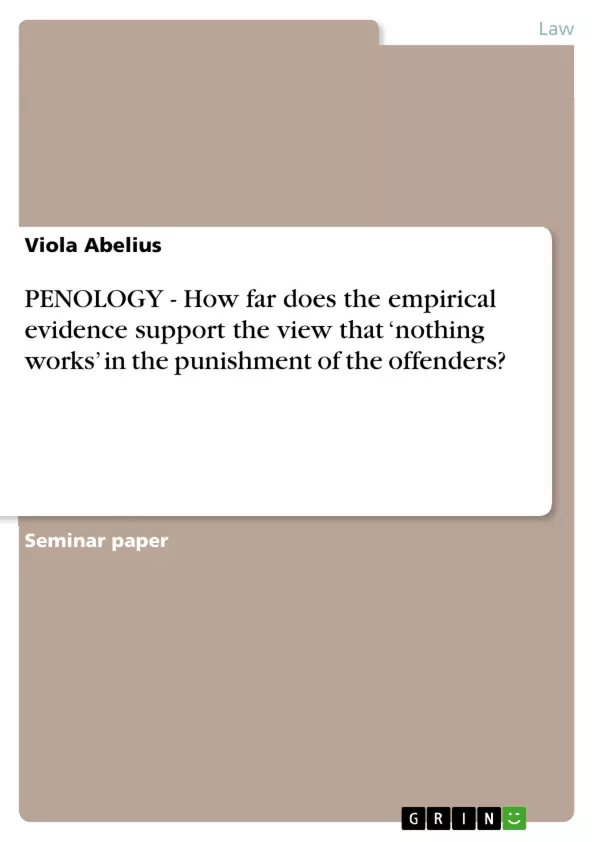In the 1970’s the ‘nothing works’ theory emerged by the works of a number of researchers doubting the effectiveness of probation and along with it rehabilitation as a means to reduce criminal offending, amongst others Robert Martinson (1974), who determined the idea of ‘nothing works’ in the first place. In 1974, Martinson stated that “…with few and isolated exceptions, the rehabilitative efforts, that have been reported so far have had no appreciable effect on recidivism.” (Sarre, 1999). This essay will try to trace out how far the empirical evidence in means of official statistics, studies and reports supports this theory.
Inhaltsverzeichnis (Table of Contents)
- Penology
- Official Statistics and their Reliability
- Rehabilitative Measures
- Recidivism Rates
- Overall Crime Rates
- Youth Crime
Zielsetzung und Themenschwerpunkte (Objectives and Key Themes)
This essay explores the validity of the "nothing works" theory in the punishment of offenders. It examines empirical evidence from official statistics, studies, and reports to determine whether rehabilitation strategies have a significant impact on reducing crime rates.- The Effectiveness of Rehabilitation
- The Reliability of Official Statistics
- The Impact of Penal Policies on Crime Rates
- The Role of Social Factors in Recidivism
- The Effectiveness of Treatment Programs for Violent Offenders
Zusammenfassung der Kapitel (Chapter Summaries)
- Penology: This chapter introduces the "nothing works" theory, highlighting its origins and the debate surrounding its validity. It focuses on the two main punishment procedures: custody and non-custodial punishments, including probation and community orders.
- Official Statistics and their Reliability: This chapter analyzes the limitations of official statistics and empirical evidence, emphasizing the potential for manipulation and misinterpretation. It examines the discrepancies between reported crimes and officially recorded crimes.
- Rehabilitative Measures: This chapter explores the emergence and subsequent questioning of rehabilitative strategies, such as community-based sanctions, in response to the "nothing works" theory. It discusses the shift towards a more punitive penal policy and the rise of the "just deserts" ideology.
- Recidivism Rates: This chapter compares reconviction rates for custody and community penalties, highlighting their potential for underestimating true recidivism. It also examines the high recidivism rates for both young and adult offenders, seemingly supporting the "nothing works" theory.
- Overall Crime Rates: This chapter examines the decline in overall crime rates in England and Wales, despite the increase in incarceration rates. It questions whether the statistics accurately reflect reality and explores the potential influence of factors like economic boom or slowdown on crime rates.
- Youth Crime: This chapter focuses on the specific issue of youth crime, analyzing trends and factors influencing recidivism rates among juvenile offenders. It examines the role of social factors and the potential for "pseudo-reconvictions," highlighting the complexity of measuring recidivism.
Schlüsselwörter (Keywords)
The primary focus of this essay is on the debate surrounding the effectiveness of rehabilitative measures in reducing crime rates. It investigates the implications of the "nothing works" theory for penology, examining empirical evidence, statistical trends, and the influence of various factors, including social conditions, on criminal behavior. Key terms and concepts include: penal policy, rehabilitation, recidivism, custody, community penalties, official statistics, crime rates, youth crime, treatment programs, and violent offenders.Frequently Asked Questions
What is the "nothing works" theory in penology?
Emerging in the 1970s, primarily through Robert Martinson's work, it suggests that rehabilitative efforts have no appreciable effect on reducing recidivism.
How reliable are official crime statistics?
The essay highlights limitations in official statistics, noting potential manipulation and discrepancies between reported crimes and officially recorded data.
What is the "just deserts" ideology?
It is a punitive penal policy shift that focuses on punishment fitting the crime rather than rehabilitating the offender.
Does incarceration effectively reduce overall crime rates?
The essay questions this by showing that crime rates in England and Wales declined even as incarceration rates rose, suggesting other factors like economic conditions may play a role.
What are "pseudo-reconvictions" in youth crime?
They refer to the complexity of measuring recidivism among juveniles, where social factors can lead to statistics that may not accurately reflect true re-offending behavior.
- Citation du texte
- Viola Abelius (Auteur), 2008, PENOLOGY - How far does the empirical evidence support the view that ‘nothing works’ in the punishment of the offenders?, Munich, GRIN Verlag, https://www.grin.com/document/180886



